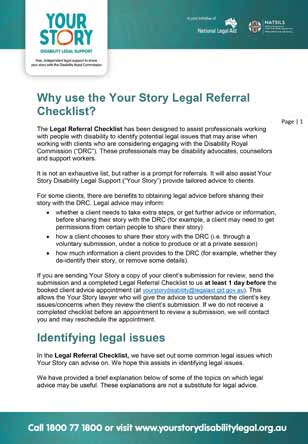Why use the Your Story Legal Referral Checklist

The Legal Referral Checklist has been designed to assist professionals working with people with disability to identify potential legal issues that may arise when working with clients who are considering engaging with the Disability Royal Commission (“DRC”). These professionals may be disability advocates, counsellors and support workers.
It is not an exhaustive list, but rather is a prompt for referrals. It will also assist Your Story Disability Legal Support (“Your Story”) provide tailored advice to clients.
For some clients, there are benefits to obtaining legal advice before sharing their story with the DRC. Legal advice may inform:
- whether a client needs to take extra steps, or get further advice or information, before sharing their story with the DRC (for example, a client may need to get permissions from certain people to share their story)
- how a client chooses to share their story with the DRC (i.e. through a voluntary submission, under a notice to produce or at a private session)
- how much information a client provides to the DRC (for example, whether they de-identify their story, or remove some details).
If you are sending Your Story a copy of your client’s submission for review, send the submission and a completed Legal Referral Checklist to us at least 1 day before the booked client advice appointment (at yourstorydisability@legalaid.qld.gov.au). This allows the Your Story lawyer who will give the advice to understand the client’s key issues/concerns when they review the client’s submission. If we do not receive a completed checklist before an appointment to review a submission, we will contact you and may reschedule the appointment.
Identifying legal issues
In the Legal Referral Checklist(PDF, 353KB), we have set out some common legal issues which Your Story can advise on. We hope this assists in identifying legal issues.
We have provided a brief explanation below of some of the topics on which legal advice may be useful. These explanations are not a substitute for legal advice.
- Confidentiality/privacy
A client may want to protect their privacy or confidentiality when sharing their story with the DRC. They may also need to consider the privacy and confidentiality of people they are speaking about if they are sharing a story which relates to others or information they have obtained in confidence (i.e. a child with disability or someone they care for). Your Story can give a client advice on how long their story will be kept confidential by the DRC, and steps they can take to share their story in an appropriately private way.
- Naming names
A client may consider it important to name other people or organisations. This is a personal choice. If a client uses the names of another person or organisation when sharing their story with the DRC there may be some legal risks. Your Story can give advice so the client understands these risks, and the steps they can take to reduce them.
- Legal action – past or present
A client may want to share with the DRC their experiences involving the legal system. They may think this is OK because the legal case has finished, was a long time ago, or settled by agreement with the other party. They may currently be in a legal case and want to share their story at the same time. Your Story can give advice on what the law or a legal agreement says about what a client can share.
- Retribution/payback
A client may have concerns that someone will punish them where they live, work or study, or that they may have difficulty accessing services, if they share their story with the DRC. Your Story can give a client advice about how to engage with the DRC in a more private way, and what could happen if the client did experience ‘payback’.
- Client documents/information
A client may be considering attaching documents/information to their submission to the DRC or providing documents in a private session. If these documents/information have been provided to a client using formal government or court processes, contain sensitive or personal information, or if they were obtained secretly or unlawfully, Your Story can advise on whether there are laws that impact the sharing of such documents and the risks involved.
Download
We aim to provide information in an accessible format. Please let us know if we can provide information in a way that's more accessible for you by contacting us.
Publication date: 17/11/2023
Publication type: factsheet
Language: English,